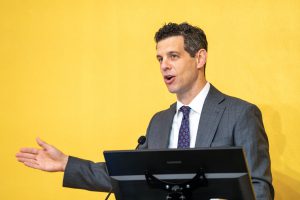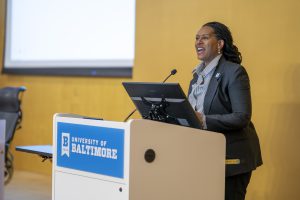The CFCC’s 2024 Symposium, “Keeping Youth in Community: Policies, Practices, and Programs to Promote Youth Justice,” aimed to center the conversation about youth justice around data, humanity and community. The courts have consistently affirmed that the goal of the youth justice system is rehabilitation. Reforms that advanced the rehabilitative goal have led to a long and steady decline in youth crime. Nevertheless, state legislatures across the nation (Maryland included) are considering substituting evidence-based youth-justice reforms with more punitive and carceral approaches.
Increased calls for more police surveillance, immediate court involvement, and longer Department of Juvenile Services supervision are clashing with efforts to ensure that youth justice system responses are developmentally appropriate, trauma-informed, and focused on equity and healing. In the midst of great disagreement, the symposium was an opportunity to give “community” and “relationship” as much airtime as “accountability” and “safety” in the youth justice conversation. The symposium convened service providers, youth, lived experts, scholars, agency leadership, and advocates to consider how community-based responses can help youth at the prevention, diversion, and reentry stages.
CFCC consistently hosts a pre-symposium event that sets the stage for the symposium by providing some grounding information. This year, thanks to funding from the federal Office of Juvenile Justice and Delinquency Prevention, the Coalition for Juvenile Justice, and the National Youth Justice Network, CFCC’s Tackling Chronic Absenteeism Project (TCAP) mentor, Arion Alston, convened a group of Baltimore City Public School students and young adults who have experienced the youth justice system to plan and perform a youth poetry showcase. The performance, titled “Your Voice Matters,” was a chamber-style poetry show in which students interspersed poems written by detained youth into the personal narratives of the young adults, who are a part of the University of Maryland Baltimore County’s CHOICE program.
The poetry showcase was packed (literally and figuratively), powerful, and it challenged our desensitization to the fact that we cage children who make mistakes. The audience, comprising law students, family members, youth advocates, community-based service providers and University of Baltimore faculty and staff, heard the pain, fear, confusion, and hopelessness that detention causes children and how care, connection and community helped them find a new path forward. Read more about “Your Voice Matters.”
The symposium began the next morning with welcoming remarks from UBalt School of Law’s new dean, LaVonda Reed, who was introduced by CFCC’s faculty director, Professor Shanta Trivedi. While the title of the symposium might lead one to anticipate the symposium was going to focus solely on diversion, CFCC Executive Director Aubrey Edwards-Luce explained that connecting kids to their community was about more than youths’ release status or case disposition. Edwards-Luce pointed to how the CFCC’s TCAP strengthens Baltimore City Public School students and their families’ connections to community relationships and resources to effectively prevent youth justice-system involvement. She then used a tool to help the attendees identify important elements of community.
 Next, Nate Balis, director of the Juvenile Justice Strategy Group at the Annie E. Casey Foundation, delivered a keynote address. Through a compelling presentation of data and lived experiences, Balis confronted the audience with the reality that our court system, which separates children from their communities when they make mistakes, is not giving us true justice or preventing youth offenses. His address highlighted how the systemic ignorance, disparate practices, and insufficient investments in community programs contribute to the overrepresentation of youths of color and youths with disabilities in the juvenile legal system. He named the media’s excessive and unfounded association of youth with crime as a “bad faith effort to demonize young people and those who are working hard to respond to youth crime.” Balis urged us to call out the bad faith portrayals of our young people.
Next, Nate Balis, director of the Juvenile Justice Strategy Group at the Annie E. Casey Foundation, delivered a keynote address. Through a compelling presentation of data and lived experiences, Balis confronted the audience with the reality that our court system, which separates children from their communities when they make mistakes, is not giving us true justice or preventing youth offenses. His address highlighted how the systemic ignorance, disparate practices, and insufficient investments in community programs contribute to the overrepresentation of youths of color and youths with disabilities in the juvenile legal system. He named the media’s excessive and unfounded association of youth with crime as a “bad faith effort to demonize young people and those who are working hard to respond to youth crime.” Balis urged us to call out the bad faith portrayals of our young people.

Nate Balis, director of the Juvenile Justice Strategy Group at the Annie E. Casey Foundation
Balis shared three innovative youth justice models from across the country that are community-based and grounded in restorative practices and positive youth development. One of the programs highlighted was Baltimore’s own Thrive Academy. Balis praised Thrive Academy for flipping the concept of risk assessment on its head. Across the country, risk assessment is typically used to justify isolating children from opportunities and giving them the worst consequences and quality of care. But Thrive Academy is making sure that youth who are at the great risk for gun related violence get the best individualized support and services.
Balis urged community members to be brave enough to take responsibility for the negative outcomes that occur after youth have been detained. In one of the most notable moments from his address, Director Balis said, “It takes a lot more courage to feel accountable. When you read about young people involved with violence, I want us to think about the data. […] We know from the research that we are doing a lot of damage [when we lock kids up] and it take a lot more courage – courage like what is in all these communities– to really work with kids who are at the greatest risk in our community. ” . Watch Balis’ keynote speech.
Each of the three symposium panels focused on community connection at distinct stages of the youth justice system: prevention, during an active case, and at reentry. The first panel was moderated by attorney and advocate Kimberly J. Martin, policy specialist at the Crime and Justice Institute. The panel discussed how community connection can prevent youth justice-system involvement and identified the increased opportunities, narrative shifts and deeper investments that are needed to make youth safety a reality. Read more about Panel One: The Community is the Key to Preventing Youth Legal System Involvement.
After a lunch break, Alice Wilkerson, executive director at Advance Maryland, moderated a panel about the importance of community connections for youth who have active court cases. Panelists shared the success of diversion and the ways that families, friends and service providers can help give youth the hope and skills they need to optimize their well-being during their court case. Read more about Panel Two: Promoting Community Bonds During Legal Proceedings.
The final panel of the symposium was moderated by Professor Eduardo Ferrer, associate professor of law and policy director of the Juvenile Justice Initiative at Georgetown University Law Center, and focused on the barriers youth experience when reconnecting to community after justice system involvement. Panelists took time to reflect on the harm that youth face in facilities, and they identified strategies the community can take to help make youths’ experiences with confinement rare, brief, and nonrecurring. Read more about Panel Three: Fostering Youth Connection to Community During Re-Entry.
CFCC Faculty Director Trivedi then closed out the day with her recollection of some of the most powerful quotes from the panelists and an invocation to fight for youth justice system transformations that treat all kids as if they were our kids. She expressed CFCC’s commitment to using its expertise in collaboration with the expertise of youths and their families, to reduce reliance on the formal court system to address youth misbehavior, and to expand the community’s capacity to be the warmth that children and families need. View Trivedi’s closing remarks.
